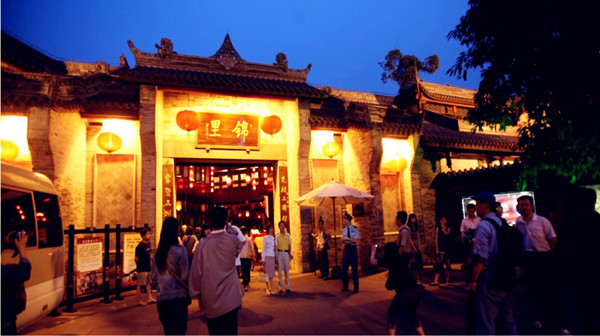

 |
Around that time, one of Shen's friends was renovating a narrow alleyway next to Wuhou Temple, which commemorates Zhuge Liang, the ingenious military adviser to Liu Bei, founder of the Shu Kingdom.
The alley became Jinli Street, where visitors can sample local snacks and admire replicas of the traditional buildings of western Sichuan.
The friend recommended Shen for work at Sangu Yuan restaurant on Jinli Street. That is when Shen got the idea of coming up with a cuisine linked to the place's history.
While the idea was not new - other restaurants were already serving such dishes - Chen was the first to come up with an entire course, complete with cold starter, main, soup and dessert.
Shen also makes sure his dishes only celebrate heroism. Thus bai zou mai cheng, an event in which Guan Yu, a righteous Shu general, is captured and killed by his enemy, has no place on his menu. Dishes based on such events may discomfort diners, Shen explains.
He uses shellfish, which is pronounced bei in Chinese, to represent Liu Bei; while Zhang Fei, another Shu general, is represented by beef, because some local tales present him as a good cook of beef, Chen says.
Even the presentation of the dishes harks back to ancient times, with Shen using a hoof-shaped stove as a table-top brazier. One wooden dish container is shaped like an ox, in a reference to the vehicle the military strategist Zhuge Liang used to transport materials to the front.
Among the restaurant's most popular dishes is Cao Chuan Jie Jian (literally, Borrowing Arrows with Thatched Boats), which has fish or shrimp baked with lemon grass served in a bamboo ship.
Cold dishes featuring Sichuan's many snacks, which are presented as the Taoist Eight Diagrams, are also much sought after.
Shen has so far invented some 30 dishes based on the Three Kingdoms theme, but says he is still not finished.
Little wonder that his cuisine has emerged as one of the most popular in Chengdu. He was even chosen by the provincial government to present Sichuan cuisine in Taipei in May and won much acclaim there.
"Only on Jinli Street and next to Wuhou Temple can people enjoy the best of both tradition and food," Shen says.

In China, most giant pandas live in the mountains of Qinling, Minshan, Qionglai, Daxiangling and Xiaoxiangling.

By the end of 2011, the number of wild giant pandas in the world was about 1,590.